In today's modern world, refrigeration is a crucial aspect of everyday life. It allows us to store food safely, keep beverages cool, and even make ice.
But when it comes to choosing the right type of fridge, the decision can be a bit overwhelming.
One of the most common dilemmas people face is the choice between a mini fridge and a regular fridge.
Understanding the differences between these two types of refrigerators is essential to making an informed decision that suits your needs and lifestyle.
- The choice between a mini fridge and a regular fridge largely depends on your specific needs, with mini fridges being ideal for small spaces and regular fridges offering more storage and features.
- While mini fridges generally consume less energy and have a lower upfront cost, regular fridges offer better long-term value due to their larger capacity and additional features.
- Both mini fridges and regular fridges can maintain similar temperatures, but the consistency of temperature may vary depending on the model and brand.
What is a Mini Fridge?
A mini fridge, also known as a compact refrigerator, is a small cooling appliance that's significantly smaller than a regular fridge.
It is a smaller refrigerator that is typically 24 inches wide, 20 inches deep, and 35-40 inches tall. It has a capacity of 1.6 to 4.5 cubic feet.
Due to its compact size, it's perfect for spaces where a full-size refrigerator might not fit, such as dorm bedrooms, offices, man caves, or even bedrooms.
Here are some common uses and benefits of a mini fridge:
- Space-Saving: Mini fridges and beverage coolers take up less space, making them ideal for small apartments, dorm bedrooms, or offices.
- Convenience: Having a mini fridge or a beverage cooler in your office or bedroom provides easy access to cold drinks and snacks without having to go to the kitchen.
- Energy-Efficient: Mini fridges and beverage coolers typically consume less energy than regular fridges, which can help reduce your electricity bill.
- Cost-Effective: Mini fridges and beverage coolers are generally cheaper than their full-sized counterparts, making them a more affordable option for those on a budget.
For more in-depth information on mini fridges, check out this comprehensive guide.
What is a Regular Fridge?
A regular fridge, also known as a full-size refrigerator, is a large appliance that's a staple in most households and is around 36 inches wide, 30 inches deep, and 70-79 inches tall. It can hold 20 to 32 cubic feet of items.
It's designed to store a significant amount of food and beverages at optimal temperatures to keep them fresh and safe for consumption.
Here are some common uses and benefits of a regular fridge:
- Large Storage Capacity: Regular fridges offer a lot more space compared to mini fridges. This makes them ideal for families or individuals who need to store a week's worth of groceries or more.
- Versatility: Most regular fridges come with a variety of features such as adjustable shelves, door bins, crisper drawers, and a freezer space. This allows for better organization and storage of different types of food and beverages.
- Long-Term Food Preservation: Regular fridges are designed to keep food fresh for longer periods. This is particularly useful for people who like to meal prep or buy groceries in bulk.
- Value for Money: While regular fridges are more expensive upfront, they offer better value in the long run due to their larger capacity and additional features.
For more detailed information on regular fridges, you can refer to this guide to choosing a fridge.
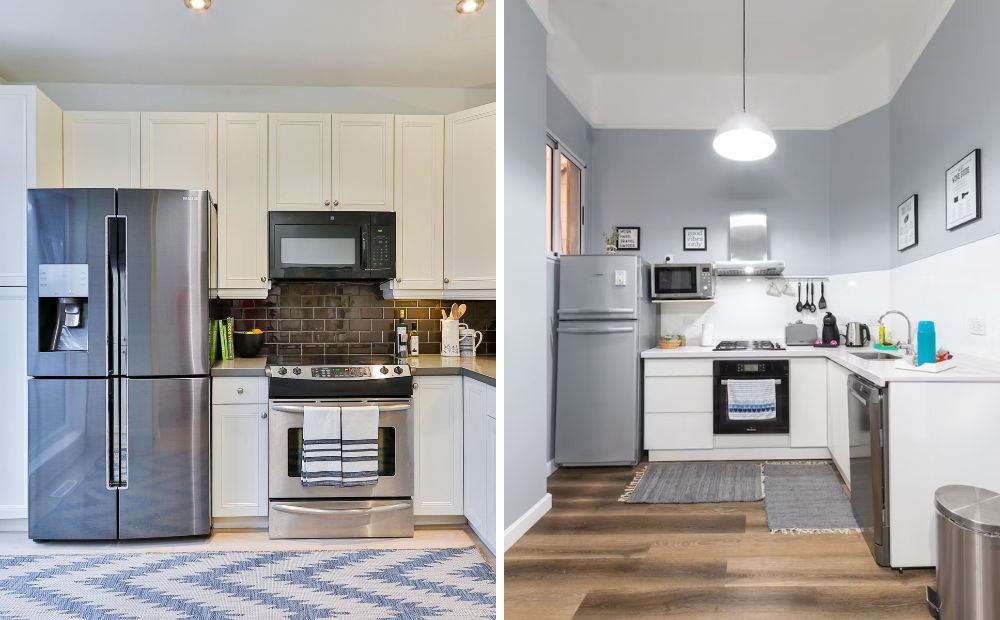
Regular fridge and a Mini Fridge
Key Differences Between a Mini Fridge and a Regular Fridge
When deciding between a mini fridge and a regular fridge, it's important to consider several key factors.
These include size and capacity, energy consumption, cost, and usability and convenience.
Let's look into each of these aspects:
- Size and Capacity: The most obvious difference between a mini fridge and a regular fridge is their size. A mini fridge is compact and designed for small spaces, making it ideal for dorm rooms, offices, or small apartments. On the other hand, a regular fridge is larger and offers more storage space, making it suitable for families or individuals who need to store a lot of food and beverages.
- Energy Consumption: Mini fridges generally consume less energy than regular fridges due to their smaller size. However, the energy efficiency can vary depending on the model and brand. It's always a good idea to check the energy rating when purchasing a fridge.
- Cost: In terms of upfront cost, mini fridges are typically cheaper than regular fridges. However, it's important to consider the long-term costs as well. Regular fridges, while more expensive initially, may offer better value over time due to their larger capacity and additional features.
- Usability and Convenience: Mini fridges offer the convenience of being able to store cold drinks and snacks in places where a regular fridge might not fit. However, they lack some of the features that regular fridges offer, such as adjustable shelves, crisper drawers, and a freezer space. Regular fridges, while requiring more space, offer better organization and storage options.
The choice between a mini fridge and a regular fridge largely depends on your specific needs and circumstances.
If you're short on space or only need to store a small amount of food and drinks, a mini fridge might be the best option.
However, if you have more space and need to store larger quantities of food and beverages, a regular fridge would be more suitable.
Detailed Comparison: Mini Fridge vs Regular Fridge
Let's delve deeper into the comparison between a mini fridge and a regular fridge, examining their features and discussing the pros and cons of each type.
Size and Capacity
- Mini Fridge: Compact and designed for small spaces. Ideal for storing a limited amount of food and beverages. Perfect for dorm rooms, offices, or small apartments.
- Regular Fridge: Larger and offers more storage space. Suitable for families or individuals who need to store a week's worth of groceries or more.
Energy Consumption
- Mini Fridges: Generally consumes less energy due to its smaller size. However, energy efficiency can vary depending on the model and brand.
- Regular Fridges: Consumes more energy but offers better cooling efficiency and more features.
Cost
- Mini Fridge: Cheaper upfront cost. However, the long-term value may be less due to limited features and capacity.
- Regular Fridge: More expensive initially but offers better value over time due to larger capacity and additional features.
Usability and Convenience
- Mini Fridge: Offers the convenience of storing cold drinks and snacks in places where a regular fridge might not fit. However, lacks some features that regular fridges offer.
- Regular Fridge: Requires more space but offers better organization and storage options. Comes with features like adjustable shelves, crisper drawers, and a freezer space.
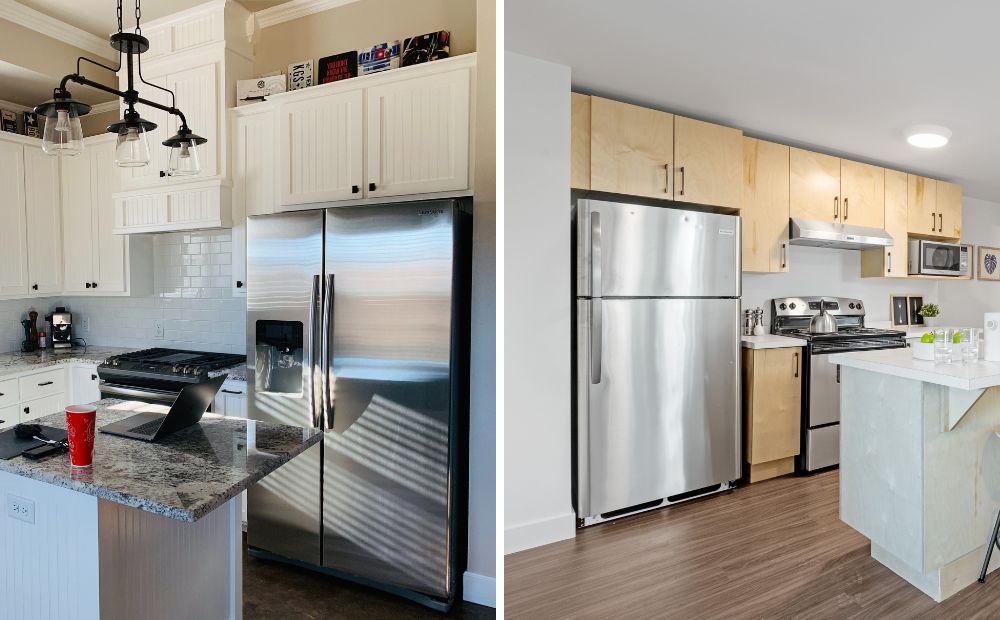
Regular Fridges
Pros and Cons
Let's delve into the pros and cons of both a mini fridge and a regular fridge.
Mini Fridge
- Pros:
- Compact Size: Mini fridges are small and compact, making them perfect for spaces where a full-size refrigerator might not fit, such as dorm rooms, offices, or small apartments.
- Lower Energy Consumption: Due to their smaller size, mini fridges generally consume less energy than regular fridges, which can help reduce your electricity bill.
- Cheaper Upfront Cost: Mini fridges are generally cheaper than their full-sized counterparts, making them a more affordable option for those on a budget.
- Convenience: Having a mini fridge in your office or bedroom provides easy access to cold drinks and snacks without having to go to the kitchen.
- Cons:
- Limited Storage Capacity: Due to their compact size, mini fridges offer limited storage space, which may not be sufficient for larger families or those who like to stock up on groceries.
- Fewer Features: Mini fridges typically lack some of the features that regular fridges offer, such as adjustable shelves, crisper drawers, and a freezer compartment.
- Variable Temperature Consistency: Some mini fridges may struggle to maintain a consistent temperature, especially if they are opened frequently.
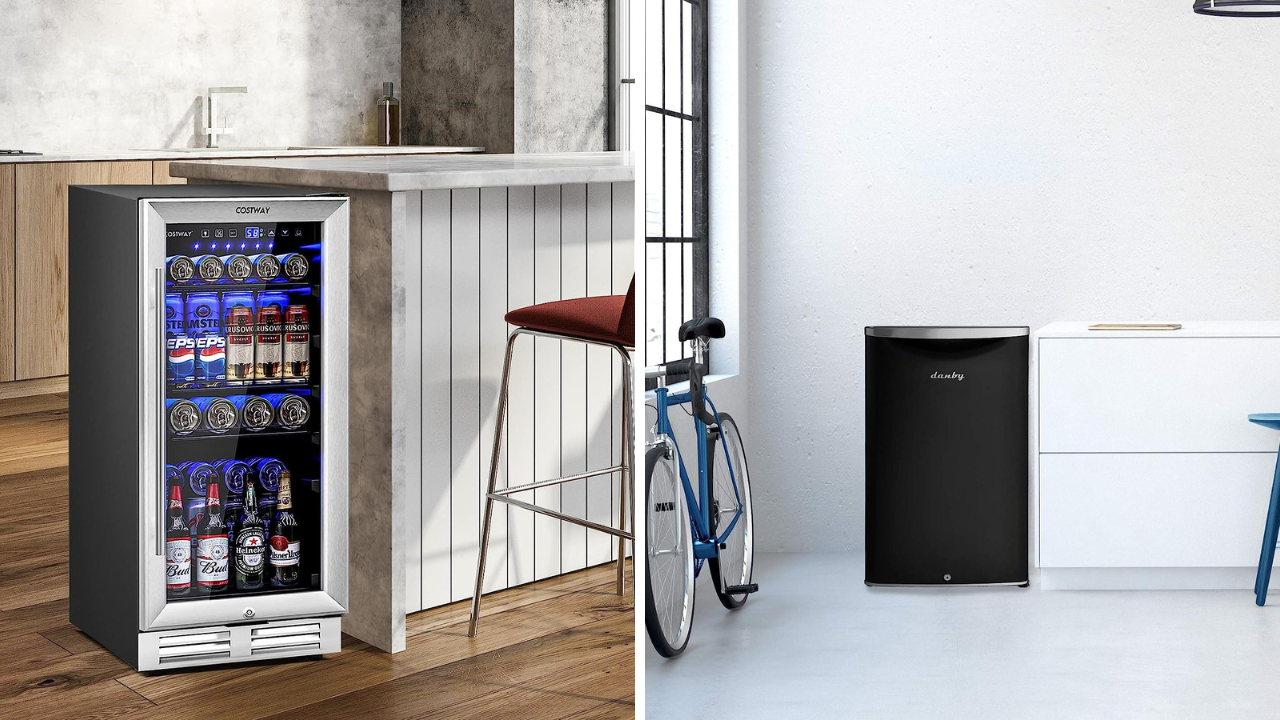

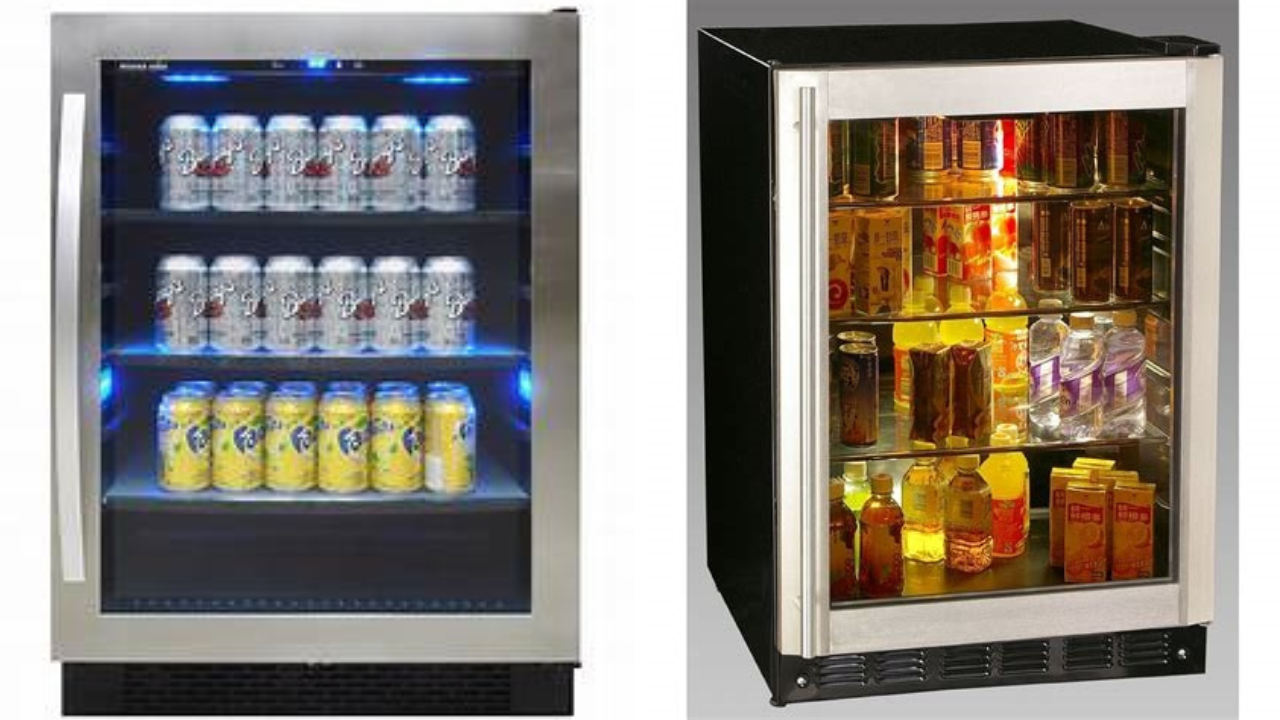

Regular Fridge
- Pros:
- Large Storage Capacity: Regular fridges offer a lot more space compared to mini fridges. This makes them ideal for families or individuals who need to store a week's worth of groceries or more.
- More Features: Most regular fridges come with a variety of features such as adjustable shelves, door bins, crisper drawers, and a freezer compartment. This allows for better organization and storage of different types of food and beverages.
- Long-Term Food Preservation: Regular fridges are designed to keep food fresh for longer periods. This is particularly useful for people who like to meal prep or buy groceries in bulk.
- Value for Money: While regular fridges are more expensive upfront, they offer better value in the long run due to their larger capacity and additional features.
- Cons:
- Requires More Space: Regular fridges are larger and require more space, which may not be available in small apartments or dorm rooms.
- Higher Upfront Cost: Regular fridges are more expensive initially, which may not be affordable for everyone.
- Higher Energy Consumption: Regular fridges consume more energy due to their larger size and additional features. However, many modern fridges are designed to be energy efficient.
The choice between a mini fridge and a regular fridge depends on your specific needs and circumstances.
If you're short on space or only need to store a small amount of food and drinks, a mini fridge might be the best option.
However, if you have more space and need to store larger quantities of food and beverages, a regular fridge would be more suitable.
restock my mini fridge with me **very extra** - Sarah Grace Vlogs
FAQs
In this section, we'll address some frequently asked questions about mini fridges and regular fridges.
Are mini fridges as cold as normal fridges?
Yes, mini fridges are designed to reach the same temperatures as regular fridges. However, the temperature consistency may vary depending on the model and brand.
Some mini fridges may struggle to maintain a consistent temperature, especially if they are opened frequently. It's always a good idea to look for a mini fridge with adjustable temperature controls for the best results.
What is the point of a mini fridge?
The main advantage of a mini fridge is its compact size. This makes it ideal for spaces where a full-size refrigerator might not fit, such as dorm rooms, offices, or small apartments.
Mini fridges are also great for keeping beverages and snacks close at hand, whether in a home office, a bedroom, or a home theater. They offer convenience and flexibility, and can even help save energy if you often find yourself opening the main fridge just to grab a drink.
Are mini refrigerators worth it
Whether a mini refrigerator is worth it or not depends on your specific needs. If you have limited space, need a fridge for a specific purpose (like storing drinks in a home office or bedroom), or want a fridge for a small office or dorm room, a mini fridge can be a great investment.
However, if you need to store a lot of food or require features like a freezer compartment or vegetable crisper, a regular fridge would be a better choice.
If you are needing a mini fridge then check out our blog post on the best mini fridges. Need an outdoor mini fridge? Then our article on thee top picks for an outdoor mini fridge will help.

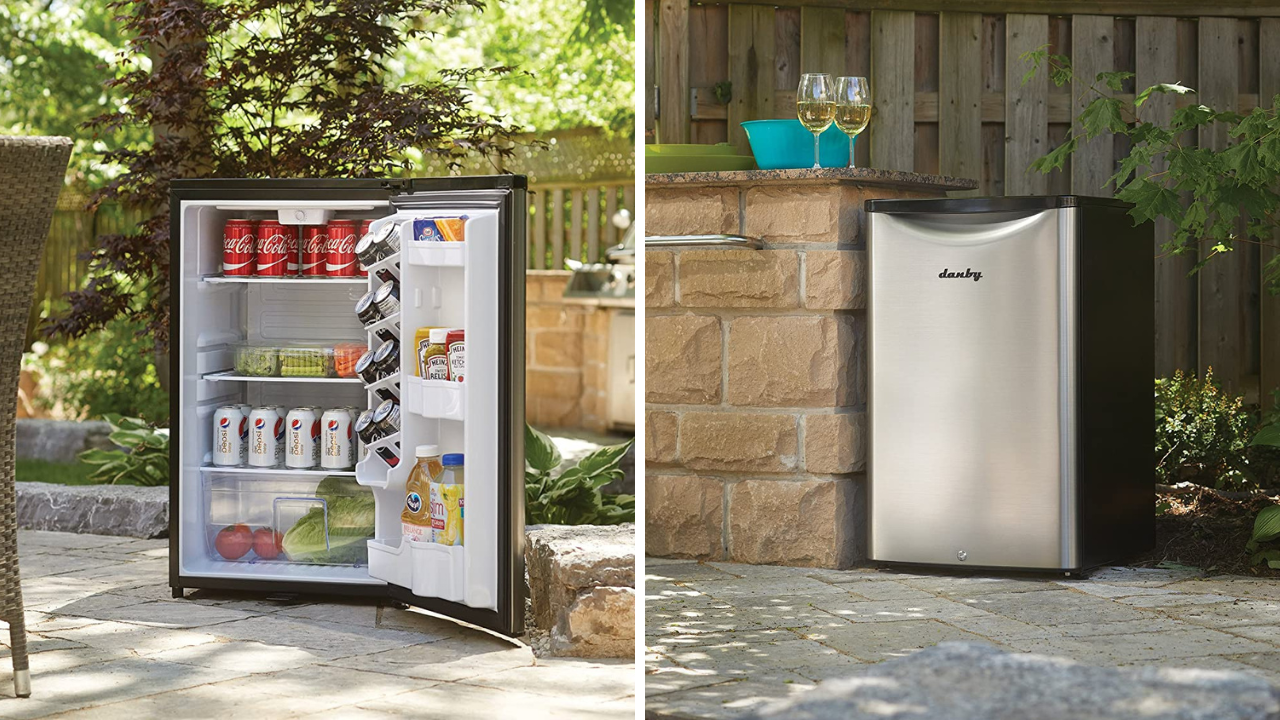
Remember, the key to choosing the right fridge is understanding your needs and choosing a model that fits those needs best. Whether it's a mini fridge or a regular fridge, both have their own unique advantages and uses.










